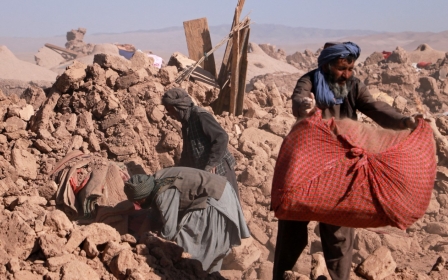Iran: Teenage girl left hospitalised after 'morality police' beating dies

A 16-year-old who was left hospitalised after an encounter with Iran's "morality police" has died, according to state media.
Armita Garawand, originally from western Kermanshah province, was accosted in early October by officers on the Tehran Metro over an alleged violation of the country's strict dress code.
Rights groups said she was attacked by them and suffered severe injuries.
On Saturday, state media, which denies she was attacked and claims she fainted at the metro station, said she had died.
"Armita Garawand, a student in Tehran, died an hour ago after intensive medical treatment and 28 days of hospitalisation in intensive care," reported the Borna news agency, affiliated with the country's youth ministry.
New MEE newsletter: Jerusalem Dispatch
Sign up to get the latest insights and analysis on Israel-Palestine, alongside Turkey Unpacked and other MEE newsletters
Following the initial incident, sources had told the Hengaw Organisation for Human Rights there was a heavy security presence around her room and that no visits were being allowed, even by family members.
The initial incident came just weeks after the anniversary of the death of Kurdish-Iranian woman Mahsa Amini, whose death was also attributed to the morality police.
Her death, which official sources claimed was due to a heart problem, sparked off widespread protests in Iran, which saw more than 500 people killed, numerous executions and tens of thousands imprisoned.
Despite the anger at the Islamic Republic's headscarf laws, the government has refused to budge and has implemented stricter rules to crackdown on the increasing number of women going without a hijab in public.
Legislation passed last month means men and women found wearing "indecent attire" in the street face fines categorised as the "sixth degree" for initial offences, followed by the "fifth degree" for subsequent transgressions.
Though some commentators have drawn parallels between Amini's death and Garawand's injuries, many of those who took part in last year's protests are wary of returning to the streets following the severity of the government crackdown.
One former protester, who was blinded in one eye by the security forces, told Middle East Eye last month that the trauma of the crackdown had dissuaded many.
"I don't think protests like last year will be repeated in Iran. I and other young Iranians went to the streets last year to change this awful situation and tell the regime officials that we don't want them," he said.
"But we lost and they won."
Middle East Eye delivers independent and unrivalled coverage and analysis of the Middle East, North Africa and beyond. To learn more about republishing this content and the associated fees, please fill out this form. More about MEE can be found here.





